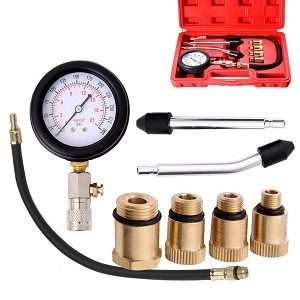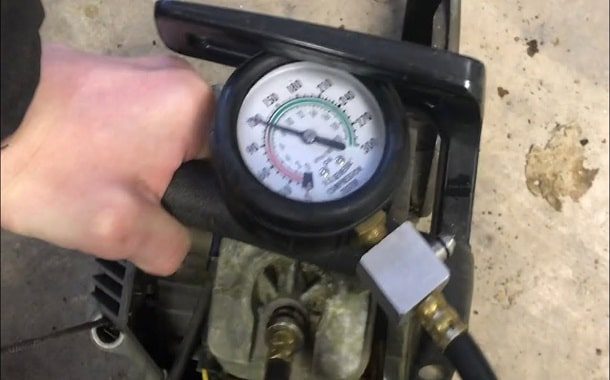How Much Does a Compression Test Cost?
Last Updated on February 6, 2024
Written by CPA Alec Pow | Content Reviewed by ![]() CFA Alexander Popinker
CFA Alexander Popinker
If you’re noticing problems with your car’s engine, a compression test is an essential diagnostic tool. But how much should you expect to pay for this automotive service?
Compression test costs can range quite a bit based on where you live and who performs the test. However, understanding what impacts the pricing can help you budget for this critical engine health check.
A compression test determines if the cylinders and piston rings in your engine are functioning correctly. During the test, a mechanic inserts a pressure gauge into each cylinder and notes the readings.
Compression should be within 10% across all cylinders for optimal performance. If readings are off, that can indicate leaking valves, blown head gaskets, worn rings or pistons, and other mechanical issues. Fixing these problems early prevents further damage.
Highlights
- Compression readings are vital for identifying worn internal engine components before bigger problems develop.
- Costs range from $50 – $200 based on the mechanic, vehicle, and location. Additional diagnostic fees may apply if repairs are needed.
- Carefully choose a trusted shop with proven expertise in automotive testing to get the most from your investment.
- Regular compression checks coupled with other maintenance provides maximum value by keeping your vehicle running efficiently.
How Much Does a Compression Test Cost?
A basic compression test typically costs $50 to $150. Here are some average price ranges:
- Independent mechanic shops: $50 – $100
- Franchise repair centers: $80 – $130
- New car dealerships: $120 – $150
High-end luxury or performance car dealers may charge over $200.
An IWSTI Forum user mentioned that a dealership quoted them around $360 for a compression test, which was perceived as high, considering it was mostly labor costs.
RepairPal.com notes that the average cost of a Ford Explorer Engine Compression Test is reported to be between $118 and $149.
A CumminsForum.com user mentioned that a good compression test done by a trained technician would cost around $1,000. Another user expressed surprise at being quoted $400 for a compression test, indicating significant variation in pricing.
Geographic location also impacts pricing significantly. Expect to pay 15-20% more for tests in major metro areas versus rural regions.
Factors Affecting the Cost of a Compression Test
Several key factors influence how much you’ll pay for a compression test:
Type of Vehicle
Diagnostic fees are generally higher for larger, more complex vehicles like trucks and SUVs versus standard passenger cars. Trucks often have bigger engines requiring more time to test each cylinder.
Location
Labor rates for mechanics vary greatly by geographic region. Expect to pay more for automotive services in areas with a higher cost of living. National chains may also charge more in certain markets.
Service Provider
Independent auto repair shops tend to offer lower diagnostic rates than dealerships. However, dealers may include a compression test as part of a manufacturer-recommended maintenance package.
Additional Tests Needed
If the initial compression test reveals problems, more in-depth engine analysis and troubleshooting may be required, increasing costs.
What’s Included in the Compression Test Cost?
The diagnostic fee covers the mechanic’s time to:
- Conduct a test drive to warm up the engine
- Remove necessary components like the air filter box to access spark plugs and spark plug wires
- Use a compression gauge to test cylinder pressure in sequence
- Log the readings from each cylinder
- Make service recommendations based on results
This fee accounts for approximately 1 hour of labor. Additional services will raise the cost.
You might also like our articles about the cost of coil pack replacement, head gasket repair, and EVAP smoke test.
What Could Add Extra Costs?
- Retesting cylinders after service: If low compression is found initially, mechanics may retest cylinders after making adjustments. Each round of tests adds cost.
- Additional diagnostic fees: If compression findings indicate serious mechanical issues, further tests like leakdown testing may be needed.
- Parts and repairs: If worn piston rings, leaking valves, gaskets, or other engine repairs are required to restore compression, parts and labor will significantly increase the cost. Major engine work can easily exceed $1,000 or more.
Tips to Save on Compression Tests
 Here are some ways to get the lowest price:
Here are some ways to get the lowest price:
- Compare rates between local service providers to find the best value.
- Ask if any special offers are available on diagnostic testing. Offers may be listed on shop websites or social media pages.
- Consider investing in a DIY compression tester or compression test kit if you have mechanical skills. Kits start around $40.
- Bundle the test with other needed maintenance items to maximize any available multi-service discounts.
- Timing matters – Avoid holidays and busy seasons at repair shops when labor rates are often higher.
Choosing the Right Mechanic for a Compression Test
The most important factor is finding an experienced technician who can perform the test correctly and interpret the results to make an accurate diagnosis. Consider these tips:
- Independent shops with specialized training in engine diagnostics may provide the highest skill level. Factory dealerships also employ highly trained techs.
- Check online reviews and ratings to verify shops have a proven track record with diagnostic testing.
- Choose an ASE Blue Seal certified shop for added confidence in their staff’s qualifications.
While dealers and highly qualified mechanics may charge more hourly, they can often diagnose issues faster and more accurately, avoiding unnecessary repairs down the road. Paying a little more upfront can save money over time.
How long does a compression test take?
A standard compression test typically takes about 1 hour from start to finish. Here is a basic timeline:
- 15-30 minutes for test drive to warm up the engine and prep work like air filter removal
- 10-15 minutes to attach test gauges and test cylinders
- 10-15 minutes to log results, make recommendations, and clean up
Additional time may be needed for retesting cylinders or further diagnostic work if issues are found initially. The total time can range from 1-2 hours on average depending on the shop and complexity of issues.
What will a compression test tell you?
A compression test checks the sealing capability of the cylinders, valves, piston rings, and head gasket. Key things it can identify:
- Low compression: Indicates loss of sealing from worn piston rings, leaking valves or head gasket, or damage to cylinder walls.
- Uneven compression: Points to issues with specific cylinders, like burnt valves or sticking rings.
- Overheating: This may denote a blown head gasket allowing combustion fuel leaks.
- Oil consumption: This could signal worn pistons, bad rings, or incorrect piston installation.
- Hard starting: This can be caused by loss of compression from worn parts.
- Rough idle: This may result from low cylinder pressures.
So in summary, the test can pinpoint many internal parts failures before bigger repairs are needed.
How much does it cost to fix engine compression?
Fixing low compression issues can range from $500 to over $2,000 depending on the repairs required and compressor issues:
- Minor parts like valves or head gasket replacement may cost $500 – $800 in labor.
- Engine overhaul with piston, ring, cylinder, and valve repairs could run $1500 – $2,000+.
- Full engine replacement is upwards of $4,000 – $6,000.
Diagnosing the exact problem is important to avoid spending more than needed. Often, addressing small issues early prevents bigger breakdowns later.



Leave a Reply
Want to join the discussion?Feel free to contribute!